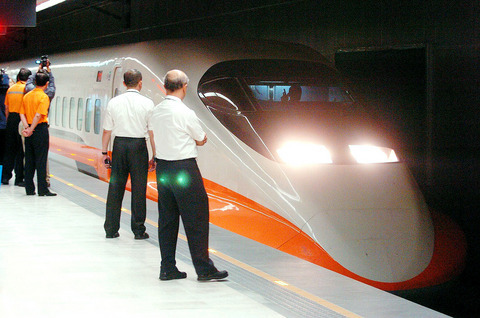Despite repeated delays in the high-speed railway project, many people remained bullish that the new infrastructure will drive up housing prices, according to a survey released by Evertrust Rehouse Co (永慶房屋) last week.
The Banciao (板橋) area of Taipei County is expected to become the top beneficiary of the expected property boom, if the nation's long-awaited bullet train commences operation next year, the survey said.
The online survey polled 1,756 people from Oct. 5 to Oct. 11. It showed that 56 percent of respondents are upbeat that the new railway will boost property prices in the neighborhood of stations, while only 26 percent expressed pessimism.

PHOTO: GEORGE TSORNG, TAIPEI TIMES
"The bullet train has been delayed several times, and this has not had a negative impact on the property market," said Liao Yung-sheng (廖永勝), president of Evertrust Rehouse Group (永慶房仲集團), a major real estate agent.
Rising people traffic around stations after the bullet train commences operation is expected to spur commercial opportunities and property development, Liao said.
"The outlook for housing markets around high-speed railway stations is very promising," he said.
The neighborhood surrounding Banciao station, a key hub incorporating stations for three major transportation systems -- the bullet train, the underground rapid transit system and the conventional railway -- is the area that could see the biggest upside potential, the survey said, citing votes by 31 percent of respondents.
The massive flow of people is expected to stimulate the construction of department stores, upscale residences and high-end commercial real estate that will bolster property prices throughout the area, Liao said.
The survey also showed that Wujih (
Wujih was favored because it could also serve flights to China at some point in the future, the survey said. It also boasts pleasant weather and a spacious living environment compared with other places, the report added.
The survey also said Lioujia ranked high because it is close to Hsinchu Science Park (新竹科學園區), the nation's No. 1 technology park.
However, up to 61 percent of people surveyed were skeptical that the launch of the high-speed railway would encourage people to commute between the north and south everyday, due to high fares and a lack of shuttle systems to and from the stations.
More than 50 percent of people think fares should be kept under NT$1,000 per single trip between Taipei and Kaohsiung, the survey said.
The rail project contractor, Taiwan High Speed Rail Corp (

Intel Corp chief executive officer Lip-Bu Tan (陳立武) is expected to meet with Taiwanese suppliers next month in conjunction with the opening of the Computex Taipei trade show, supply chain sources said on Monday. The visit, the first for Tan to Taiwan since assuming his new post last month, would be aimed at enhancing Intel’s ties with suppliers in Taiwan as he attempts to help turn around the struggling US chipmaker, the sources said. Tan is to hold a banquet to celebrate Intel’s 40-year presence in Taiwan before Computex opens on May 20 and invite dozens of Taiwanese suppliers to exchange views

Application-specific integrated circuit designer Faraday Technology Corp (智原) yesterday said that although revenue this quarter would decline 30 percent from last quarter, it retained its full-year forecast of revenue growth of 100 percent. The company attributed the quarterly drop to a slowdown in customers’ production of chips using Faraday’s advanced packaging technology. The company is still confident about its revenue growth this year, given its strong “design-win” — or the projects it won to help customers design their chips, Faraday president Steve Wang (王國雍) told an online earnings conference. “The design-win this year is better than we expected. We believe we will win

Chizuko Kimura has become the first female sushi chef in the world to win a Michelin star, fulfilling a promise she made to her dying husband to continue his legacy. The 54-year-old Japanese chef regained the Michelin star her late husband, Shunei Kimura, won three years ago for their Sushi Shunei restaurant in Paris. For Shunei Kimura, the star was a dream come true. However, the joy was short-lived. He died from cancer just three months later in June 2022. He was 65. The following year, the restaurant in the heart of Montmartre lost its star rating. Chizuko Kimura insisted that the new star is still down

While China’s leaders use their economic and political might to fight US President Donald Trump’s trade war “to the end,” its army of social media soldiers are embarking on a more humorous campaign online. Trump’s tariff blitz has seen Washington and Beijing impose eye-watering duties on imports from the other, fanning a standoff between the economic superpowers that has sparked global recession fears and sent markets into a tailspin. Trump says his policy is a response to years of being “ripped off” by other countries and aims to bring manufacturing to the US, forcing companies to employ US workers. However, China’s online warriors